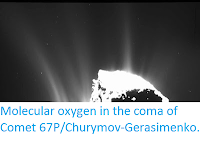Comet 2P/Encke reaches its perihelion (the closest point
on its orbit to the Sun) on Friday 10 March 2017 (today), when it will be
approximately 0.34 AU from the Sun (i.e. 34% of the distance between the
Earth and the Sun, inside the orbit of the planet Mercury). Two days later, on Sunday 12 March, it will make its closest approach to Earth this orbit, reaching 0.34 AU from us. Due to its closeness to the Sun in the sky it will not be possible to view the comet at this time.
Image of 2P/Encke taken on 4 December 2007 from the Holloway Comet Observatory in Van Buren, Arkansas. Mike Holloway/Cometography.
Comet 2P/Encke was first observed by Pierre Méchain in 1786, though it is named after Johann Franz Encke who recognised it as a periodic comet in 1819. The designation 2P implies that it is the second periodic comet discovered (after Halley's Comet, or 1P/Halley).
Image of 2P/Encke taken on 12 October 2013. Damian Peach/Universe Today.
2P/Encke s a short period, Jupiter Family comet (a
comet with a period of less
than 20 years with an orbit angled at less than 30° to the plane of the
Solar System), with a 3.3 year orbital period (the second shortest period of any known comet) and an elliptical orbit
tilted at 11.8° to the plane of the Solar System, which takes it from
0.34 AU from the Sun (i.e 0.34 times as far from the Sun as the Earth,
between the orbits of Mercury and Venus) to 4.09 AU from the Sun (i.e.
5.52 times the average distance between the Earth and the Sun, slightly inside the orbit of Jupiter). This means that close encounters between
the comet and Earth are quite common, with the last having occurred in October 2013 and the next predicted for July 2030. It also has
frequent close encounters with the planets Mercury, with the last having occurred in November 2013 and the next predicted for January 2037, and Jupiter, with the last having
happened in July 1998 and the next predicted for January 2022.
See also...
Follow Sciency Thoughts on Facebook.








